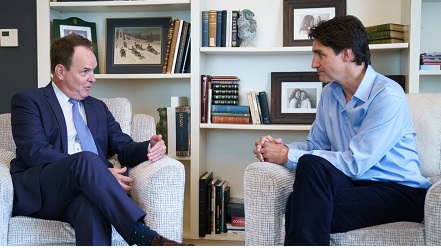Ports, the federal government stops the strikes
OTTAWA – Stop the strikes in the major Canadian ports of Quebec and British Columbia: the federal Labor Minister, Steven MacKinnon, decided it today, imposing a “final and binding arbitration” on the parties. Port workers had been abstaining from work for several days, as unions and employers had failed to reach an agreement: workers at the port of Montreal had taken the picket lines on Sunday evening, joining their colleagues already on strike at the British Columbia.
An abstention from work that has hindered a flow of goods – those that pass through these channels daily – worth over 1.2 billion dollars per day at the ports of Montreal and Vancouver. So, to avoid further economic damage, Minister MacKinnon instructed the Canada Industrial Relations Board to “order that all operations and duties at the ports resume and to assist the parties in settling their collective agreements by imposing final and binding arbitration”. MacKinnon added that he expects work to resume in full swing within a few days. “These work stoppages put our well-deserved reputation for reliability at risk – the minister then said -: Canadians have limited tolerance for economic self-harm”.
It’s the second time in a matter of months that the Liberal-led federal government has imposed binding arbitration to end a work stoppage: the last time it used those powers to end the shutdown of Canada’s two largest rail companies, last August. But the “Teamsters” union (representing workers of the two companies, CN-Rail and CPKC) has launched a lawsuit against the government to appeal against the decision to end the work stoppage: the matter is still before the courts. MacKinnon already knows that this new “diktat” from the federal government will also arouse controversy, but he reiterated that with that magnitude of economic impact “any responsible government” would have intervened. “As the economic losses threaten the country and begin to mount, it is up to the government to ensure that a fair settlement is reached” MacKinnon stressed.
Meanwhile, NDP leader Jagmeet Singh criticized the government’s decision, accusing Prime Minister Justin Trudeau and his party of having succumbed to “corporate greed” and taking power away from unions. “Canadians will pay for Trudeau’s anti-worker attack” Singh said, according to Global News. “Back-to-work orders suppress wages for all Canadians, so billionaires get richer and the rest of Canadians fall further behind. And especially in the case of the ports negotiations, Trudeau’s order is putting good Canadian jobs at risk” Singh said, adding that “the only place to get a fair deal is at the bargaining table”. And he also added with a post on X – Twitter: “Trudeau has caved to corporate greed by meddling in the ports dispute, again. He’s basically taken all the power away from workers and their unions”.
In the last weeks, however, Singh himself had more than one opportunity to bring down Trudeau’s “anti-worker” government, with the motions of non-confidence from the Conservatives, but he did not do so: his party, the NDP, did not support the motions, once again saving Trudeau’s Liberal government. Who knows what the Canadian workers think. We’ll probably find out in the next federal election.
In the pic above: federal Labor Minister, Steven MacKinnon, with Prime Minister Justin Trudeau (from Twitter X – @stevenmackinnon)



